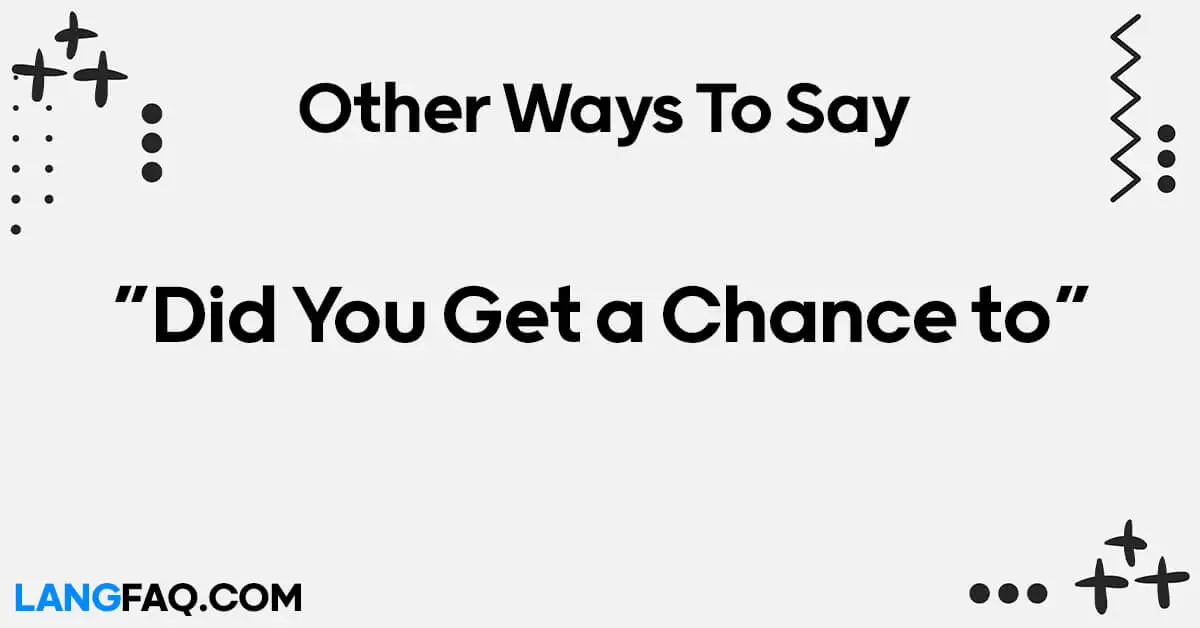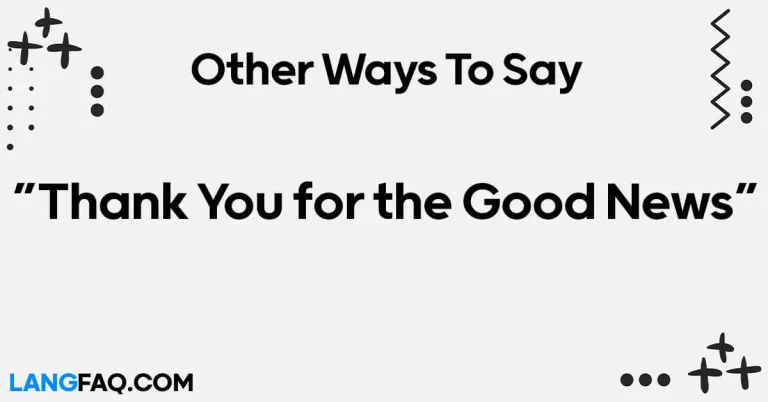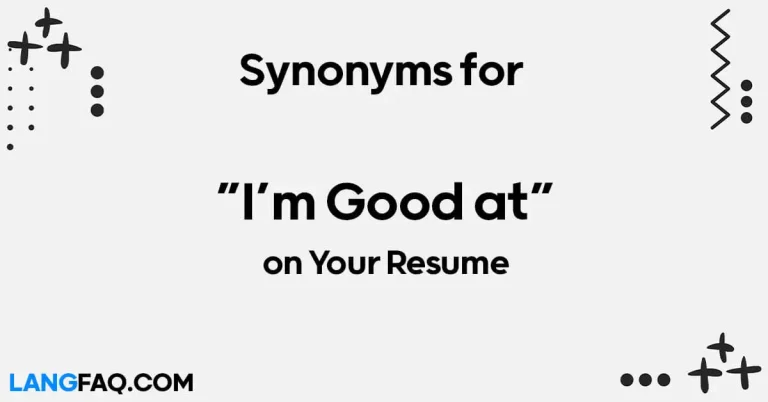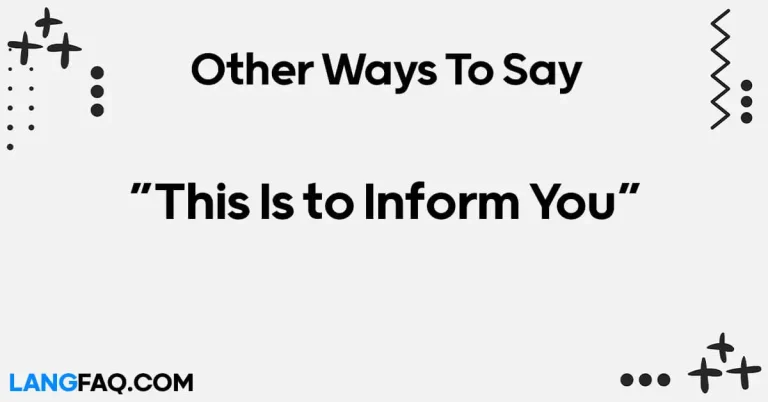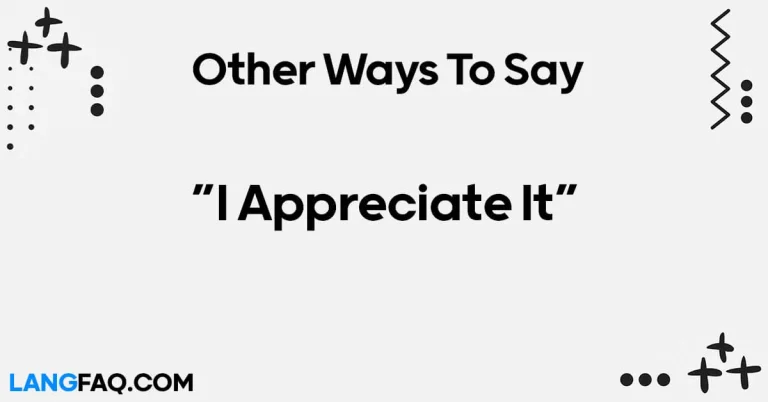Welcome to a linguistic journey where we explore varied expressions to inquire about someone’s activities. Communication is a dynamic art, and mastering alternative phrases adds flair to your interactions. In this article, we delve into “12 Other Ways to Say ‘Did You Get a Chance to,'” providing insights, examples, and a deeper understanding of each phrase.
12 Other Ways to Say “Did You Get a Chance to”
Here are 12 alternative ways to express “Did You Get a Chance to”:
- Were you able to
- Did you manage to
- Have you had an opportunity to
- Could you find time to
- Did you get an occasion to
- Have you explored
- Were you successful in
- Have you had a moment to
- Did you happen to
- Could you spare a moment for
- Were you in a position to
- Did you have the time to
Here is a table with meanings and examples for the 12 alternative ways to say “Did You Get a Chance to”:
| Expression | Meaning | Example |
|---|---|---|
| Were you able to | Inquiring about someone’s capability or success in completing a task. | Were you able to finish the report on time? |
| Did you manage to | Asking if someone successfully accomplished a particular task or activity. | Did you manage to attend the meeting yesterday? |
| Have you had an opportunity to | Checking if someone had the chance to engage in a specific activity or task. | Have you had an opportunity to review the proposal? |
| Could you find time to | Requesting if someone could allocate time for a particular task or event. | Could you find time to check the new updates? |
| Did you get an occasion to | Inquiring if someone had an opportunity or reason to do something. | Did you get an occasion to visit the new office? |
| Have you explored | Asking if someone has ventured into or examined a particular subject or area. | Have you explored the latest trends in technology? |
| Were you successful in | Checking if someone achieved success or completion in a given task. | Were you successful in finalizing the project proposal? |
| Have you had a moment to | Inquiring if someone has had a brief period of time for a specific activity. | Have you had a moment to look at the new design? |
| Did you happen to | Asking if something occurred or if someone had the chance to do something by chance. | Did you happen to catch the latest news? |
| Could you spare a moment for | Requesting if someone could allocate a short period for a particular task. | Could you spare a moment for a quick discussion? |
| Were you in a position to | Checking if someone was able or capable of doing something. | Were you in a position to attend the training session? |
| Did you have the time to | Inquiring if someone had the available time to complete a specific task. | Did you have the time to read the research paper? |
Variety in communication is essential for effective and engaging interactions. These alternative expressions provide a range of ways to ask about someone’s opportunity or ability to do something, adding richness and flexibility to your language. By incorporating these alternatives, you can make your communication more dynamic and expressive.
Is It Correct to Say “Did You Get a Chance to”?
The phrase “Did You Get a Chance to” is a commonly used and grammatically correct expression. It is a polite and indirect way of inquiring whether someone had the opportunity or time to do something.
Definition and Usage Insights
- Politeness: This phrase is considered polite and courteous, making it suitable for various social and professional contexts.
- Indirect Inquiry: It avoids direct questioning, which can be perceived as more formal or pressuring.
- Flexibility: The phrase is versatile and can be used in both formal and informal situations.
Example Usage:
- Formal Context: “Did you get a chance to review the contract amendments, Mr. Anderson?”
- Informal Context: “Hey, did you get a chance to check out the new updates on the project?”
Dictionary Insight: The Cambridge Dictionary defines “get a chance to” as an informal phrase meaning “to have the opportunity to do something.”
Grammar/Usage Rules:
- The phrase is a grammatically correct combination of past tense (“did you get”) and the opportunity-based expression (“a chance to”).
Pros:
- Polite and respectful.
- Applicable in various situations.
- Avoids direct pressure.
Cons:
- Might be seen as slightly indirect in very formal settings.
Tips:
- Use this phrase when you want to inquire about someone’s opportunity without sounding too formal or direct.
- It’s effective in scenarios where you want to show consideration for the other person’s schedule or availability.
Professional Mail Example With “Did You Get a Chance to”
Subject: Follow-Up on Project Timeline Review
Dear [Recipient’s Name],
I trust this email finds you well. I am writing to follow up on the recent changes proposed for the project timeline. We value your expertise and would appreciate your insights on the adjustments made.
Did you get a chance to review the updated project timeline? Your feedback is crucial in ensuring that we align our strategies and goals effectively. As we are aiming to finalize these changes by the end of the week, your prompt attention to this matter would be highly beneficial.
If you have any questions or require additional information, please feel free to reach out. Your collaboration is invaluable to the success of our project.
Thank you for your time, and I look forward to hearing from you soon.
Best regards,
[Your Full Name] [Your Position] [Your Company] [Your Contact Information]
Were You Able To
In the realm of effective communication, the phrase “Were you able to” stands as a versatile option. This expression conveys a sense of capability and accomplishment, making it suitable for both formal and informal contexts.
Definition and Usage Insights
The phrase “Were you able to” is a polite and indirect way of asking if someone successfully completed a task or achieved a goal. It implies a level of accomplishment and acknowledges the individual’s skills or efforts.
When to Use:
- Formal Context: In professional settings or when addressing someone in authority, such as a manager or supervisor.
- Example: “Were you able to finalize the project proposal, Mr. Johnson?”
- Informal Context: In everyday conversations with colleagues or friends.
- Example: “Hey, were you able to check out the new software update?”
Tips:
- Use this phrase when you want to acknowledge someone’s capability without sounding overly formal.
- It’s effective in scenarios where the task might have been challenging or required effort.
Variations:
- Colleagues: “Did you manage to submit the report on time?”
- Friends: “Were you able to catch the latest episode of the show?”
Scenario: Colleague Interaction
Dialogue Snippet: Colleague 1: Hey, were you able to complete the market analysis for the presentation? Colleague 2: Yes, I finished it yesterday. Were you able to prepare the visuals?
Email Sample:
Subject: Quick Check-in
Hi [Colleague’s Name],
I hope this email finds you well. Were you able to finalize the budget estimates for our upcoming meeting? Let me know if you need any assistance.
Best regards, [Your Name]
Did You Manage To
The phrase “Did you manage to” adds a touch of casual inquiry to your communication, making it suitable for various situations. It subtly implies effort and accomplishment.
Definition and Usage Insights
Asking “Did you manage to” is a friendly yet effective way to inquire about the successful completion of a task. It suggests a level of effort or challenge in the accomplishment.
When to Use:
- Formal Context: When addressing colleagues or superiors in a professional environment.
- Example: “Did you manage to compile the quarterly reports?”
- Informal Context: In casual conversations with friends or coworkers.
- Example: “Hey, did you manage to fix the issue with your laptop?”
Tips:
- This phrase is versatile and can be used in various contexts, maintaining a friendly tone.
- It’s effective when you want to show interest in someone’s progress without being too formal.
Variations:
- Mentor-Mentee Context: “Did you manage to grasp the key concepts from the training session?”
- Everyday Conversation: “Did you manage to finish reading that book I recommended?”
Scenario: Friend Interaction
Dialogue Snippet: Friend 1: Hey, did you manage to book tickets for the concert? Friend 2: Yeah, I got them yesterday. Did you manage to convince John to join us?
Email Sample:
Subject: Quick Question
Hi [Friend’s Name],
Quick one – did you manage to find a suitable venue for the dinner party? Let me know your thoughts.
Cheers, [Your Name]
Have You Had an Opportunity To
The phrase “Have you had an opportunity to” adds a touch of formality to your inquiry, making it suitable for professional settings. It emphasizes the availability of a chance rather than merely asking about completion.
Definition and Usage Insights
This phrase is a polished way of asking if someone has had the chance to engage in a particular activity or task. It denotes a level of formality and respect for the individual’s schedule.
When to Use:
- Formal Context: When addressing superiors, clients, or individuals in higher-ranking positions.
- Example: “Have you had an opportunity to review the updated proposal, Ms. Anderson?”
- Informal Context: In more casual professional settings or when communicating with colleagues you respect.
- Example: “Hey, have you had an opportunity to check the new project details?”
Tips:
- Use this phrase when you want to convey a sense of formality and respect.
- It’s effective when discussing tasks or activities that require thoughtful consideration.
Variations:
- Client Interaction: “Have you had an opportunity to explore the latest product features?”
- Mentor-Mentee Context: “Have you had an opportunity to attend the networking event?”
Scenario: Superior Interaction
Dialogue Snippet: Employee: Good morning, Ms. Rodriguez. Have you had an opportunity to go through the sales projections for the next quarter? Manager: Good morning. Yes, I reviewed them this morning. Have you had an opportunity to discuss the projections with the sales team?
Email Sample:
Subject: Request for Review
Dear [Manager’s Name],
I hope this email finds you well. Have you had an opportunity to review the proposed changes to the marketing strategy? Your insights would be invaluable.
Best regards, [Your Name]
Could You Find Time To
Asking “Could you find time to” adds a polite touch to your inquiry, respecting the individual’s schedule. It’s suitable for both formal and informal settings, allowing for flexibility in communication.
Definition and Usage Insights
This phrase is a courteous way of asking if someone can allocate time for a specific task or event. It acknowledges the importance of their time and allows for a more considerate approach.
When to Use:
- Formal Context: When addressing superiors or individuals with a busy schedule.
- Example: “Could you find time to discuss the upcoming project, Mr. Bennett?”
- Informal Context: In everyday conversations with colleagues or friends.
- Example: “Hey, could you find time to go over the budget details later?”
Tips:
- Use this phrase when you want to convey respect for the individual’s time constraints.
- It’s effective when discussing tasks that might require a more extended discussion or attention.
Variations:
- Team Collaboration: “Could you find time to join the brainstorming session this afternoon?”
- Friend Interaction: “Could you find time to grab a coffee later?”
Scenario: Collaborative Project
Dialogue Snippet: Team Member 1: Could you find time to provide feedback on the project proposal by tomorrow? Team Member 2: Of course, I’ll make time for it. Could you find time to finalize the budget figures by then?
Email Sample:
Subject: Collaboration Request
Hi [Team Member’s Name],
I hope this message finds you well. Could you find time to review the draft presentation before our meeting tomorrow? Your input is highly valued.
Thanks, [Your Name]
Did You Get an Occasion To
The phrase “Did you get an occasion to” adds a touch of formal elegance to your inquiry, making it suitable for professional contexts where a more refined language is appreciated.
Definition and Usage Insights
Asking if someone “got an occasion to” do something is a polite way of inquiring about their opportunity or moment to engage in a particular task. It carries a sense of formality and respect.
When to Use:
- Formal Context: Ideal for written communication with superiors or clients.
- Example: “Did you get an occasion to review the contract amendments, Mr. Thompson?”
- Informal Context: In conversations where a more formal tone is desired.
- Example: “Hello, did you get an occasion to explore the new project details?”
Tips:
- Use this phrase when you want to add a touch of sophistication to your inquiry.
- It’s effective when discussing tasks or activities that may require a more elevated tone.
Variations:
- Client Interaction: “Did you get an occasion to attend the industry conference last week?”
- Mentor-Mentee Context: “Did you get an occasion to discuss your career goals with your mentor?”
Scenario: Client Interaction
Dialogue Snippet: Business Associate: Good afternoon, Mr. Anderson. Did you get an occasion to evaluate the latest proposal? Client: Good afternoon. Yes, I got an occasion to go through it. Did you get an occasion to address the concerns I raised?
Email Sample:
Subject: Follow-Up on Proposal
Dear [Client’s Name],
I trust this email finds you well. Did you get an occasion to review the updated proposal? Your insights are highly valuable to us.
Best regards, [Your Name]
Have You Explored
The phrase “Have you explored” injects a sense of curiosity and openness into your inquiry, making it suitable for both formal and informal settings. It implies a willingness to discover or learn.
Definition and Usage Insights
Asking if someone has “explored” a particular subject or area suggests a dynamic and inquisitive approach. It’s ideal for situations where curiosity and engagement are encouraged.
When to Use:
- Formal Context: When discussing new projects, initiatives, or opportunities.
- Example: “Have you explored the potential benefits of the proposed collaboration, Ms. Turner?”
- Informal Context: In casual conversations, especially when discussing creative or innovative endeavors.
- Example: “Hey, have you explored the new features in the software update?”
Tips:
- Use this phrase when you want to convey a sense of openness and encourage exploration.
- It’s effective when discussing tasks or activities that may involve discovery and learning.
Variations:
- Colleague Interaction: “Have you explored alternative solutions to the current challenge?”
- Friend Interaction: “Have you explored the local food scene in the new neighborhood?”
Scenario: Project Discussion
Dialogue Snippet: Team Member 1: Have you explored incorporating the latest design trends into our website? Team Member 2: Yes, I’ve explored a few options. Have you explored potential collaborations with external vendors?
Email Sample:
Subject: Brainstorming Session
Hi [Team Member’s Name],
Hope you’re well. Have you explored the feasibility of incorporating AI elements into our upcoming project? Let’s discuss it in our next brainstorming session.
Cheers, [Your Name]
Were You Successful In
The phrase “Were you successful in” adds a positive and goal-oriented touch to your inquiry. It’s suitable for various contexts, emphasizing the achievement or completion of a task.
Definition and Usage Insights
Asking if someone was “successful in” accomplishing a particular task conveys a sense of positivity and acknowledges the individual’s efforts toward a goal.
When to Use:
- Formal Context: When addressing achievements or milestones in a professional setting.
- Example: “Were you successful in implementing the new software updates, Mr. Davis?”
- Informal Context: In casual conversations where a positive tone is desired.
- Example: “Hey, were you successful in resolving the technical issue?”
Tips:
- Use this phrase when you want to emphasize the positive outcome of a task.
- It’s effective when discussing achievements or successful completion of projects.
Variations:
- Team Collaboration: “Were you successful in securing the partnership for the upcoming event?”
- Friend Interaction: “Were you successful in finding a new apartment?”
Scenario: Project Completion
Dialogue Snippet: Colleague 1: Were you successful in meeting the deadline for the client presentation? Colleague 2: Yes, we were successful in delivering it on time. Were you successful in coordinating with the design team?
Email Sample:
Subject: Project Success
Hi [Colleague’s Name],
I hope this email finds you well. Were you successful in finalizing the project proposal? Your efforts are truly appreciated.
Best regards, [Your Name]
Have You Had a Moment To
The phrase “Have you had a moment to” introduces a polite and considerate tone to your inquiry, suitable for various situations where time and attention are valued.
Definition and Usage Insights
Asking if someone has “had a moment to” address a particular task or request acknowledges the need for time and respects the individual’s schedule.
When to Use:
- Formal Context: When making requests or inquiries in a professional setting.
- Example: “Have you had a moment to review the financial projections, Ms. Garcia?”
- Informal Context: In casual conversations with colleagues or friends.
- Example: “Hey, have you had a moment to discuss the upcoming team-building event?”
Tips:
- Use this phrase when you want to convey consideration for the individual’s time constraints.
- It’s effective when discussing tasks that may require a more extended or focused discussion.
Variations:
- Mentor-Mentee Context: “Have you had a moment to reflect on your career goals?”
- Friend Interaction: “Have you had a moment to think about our weekend plans?”
Scenario: Collaborative Project
Dialogue Snippet: Team Member 1: Hi, have you had a moment to go over the project timeline? Team Member 2: Not yet. I’ll make sure to have a moment for it after lunch. Have you had a moment to confirm the meeting details with the client?
Email Sample:
Subject: Quick Discussion
Hi [Team Member’s Name],
I hope your day is going well. Have you had a moment to go through the proposed changes in the project plan? Let’s catch up when you have some time.
Cheers, [Your Name]
Did You Happen To
The phrase “Did you happen to” introduces a sense of chance or casual occurrence into your inquiry. It’s suitable for various situations, adding a light and informal tone to your communication.
Definition and Usage Insights
Asking if someone “happened to” do something implies a sense of spontaneity or casual engagement. It’s an excellent choice when you want to keep the tone informal and friendly.
When to Use:
- Formal Context: In situations where a more relaxed and approachable tone is appropriate.
- Example: “Did you happen to attend the industry conference last week, Mr. Peterson?”
- Informal Context: In casual conversations with colleagues or friends.
- Example: “Hey, did you happen to try the new restaurant downtown?”
Tips:
- Use this phrase when you want to maintain a friendly and easygoing tone.
- It’s effective in scenarios where the inquiry is not time-sensitive or urgent.
Variations:
- Colleague Interaction: “Did you happen to catch the latest team update?”
- Friend Interaction: “Did you happen to see the movie that everyone’s talking about?”
Scenario: Casual Catch-Up
Dialogue Snippet: Friend 1: Did you happen to visit the art exhibition over the weekend? Friend 2: Oh, I did! Did you happen to run into our old classmate there?
Email Sample:
Subject: Quick Question
Hi [Friend’s Name],
Just curious – did you happen to come across any interesting books lately? Let’s catch up soon.
Best, [Your Name]
Could You Spare a Moment For
The phrase “Could you spare a moment for” adds a polite and considerate touch to your inquiry. It’s suitable for various contexts where you’re requesting someone’s focused attention.
Definition and Usage Insights
Asking if someone “could spare a moment for” a particular task or discussion conveys respect for their time and emphasizes the importance of the request.
When to Use:
- Formal Context: When making requests or seeking someone’s attention in a professional setting.
- Example: “Could you spare a moment for a quick discussion about the upcoming project, Ms. Taylor?”
- Informal Context: In casual conversations where a respectful tone is desired.
- Example: “Hey, could you spare a moment for a chat about the weekend plans?”
Tips:
- Use this phrase when you want to convey the significance of the request and respect for the individual’s time.
- It’s effective when discussing matters that may require focused attention or discussion.
Variations:
- Team Collaboration: “Could you spare a moment for brainstorming ideas for the new campaign?”
- Friend Interaction: “Could you spare a moment for coffee later?”
Scenario: Professional Request
Dialogue Snippet: Colleague 1: Could you spare a moment for a review of the project milestones? Colleague 2: Certainly. I can spare a moment after the team meeting. Could you spare a moment for a quick update on the client’s feedback?
Email Sample:
Subject: Request for Discussion
Dear [Colleague’s Name],
I hope this message finds you well. Could you spare a moment for a brief discussion on the upcoming client presentation? Your insights are crucial.
Best regards, [Your Name]
Were You In a Position To
The phrase “Were you in a position to” adds a formal and structured tone to your inquiry, suitable for professional contexts where a more detailed or official response is expected.
Definition and Usage Insights
Asking if someone “was in a position to” do something implies a level of authority, capability, or readiness. It’s ideal for situations where a more precise or official response is required.
When to Use:
- Formal Context: In professional interactions, especially when addressing individuals in positions of authority.
- Example: “Were you in a position to approve the budget allocation, Mr. Foster?”
- Informal Context: In more casual professional settings where a formal tone is still necessary.
- Example: “Hey, were you in a position to attend the training session last week?”
Tips:
- Use this phrase when you want to convey a sense of authority or readiness.
- It’s effective when discussing tasks or activities that require a more official or formal response.
Variations:
- Colleague Interaction: “Were you in a position to provide feedback on the new marketing strategy?”
- Mentor-Mentee Context: “Were you in a position to mentor the new team member?”
Scenario: Managerial Inquiry
Dialogue Snippet: Employee: Good afternoon, Mr. Turner. Were you in a position to review the proposed changes to the project timeline? Manager: Good afternoon. Yes, I was in a position to review them. Were you in a position to coordinate with the client on this matter?
Email Sample:
Subject: Official Inquiry
Dear [Manager’s Name],
I trust this email finds you well. Were you in a position to evaluate the potential impact of the new regulations on our project timeline? Your insights are crucial.
Best regards, [Your Name]
Did You Have the Time To
The phrase “Did you have the time to” adds a straightforward and practical tone to your inquiry, suitable for various contexts where time is a crucial factor.
Definition and Usage Insights
Asking if someone “had the time to” do something emphasizes the practical aspect of time management. It’s suitable for both formal and informal settings.
When to Use:
- Formal Context: In professional interactions, especially when discussing time-sensitive matters.
- Example: “Did you have the time to review the client’s feedback, Ms. Mitchell?”
- Informal Context: In everyday conversations where a more direct and practical tone is appropriate.
- Example: “Hey, did you have the time to go through the project updates?”
Tips:
- Use this phrase when you want to emphasize the practicality of the inquiry.
- It’s effective when discussing tasks or activities that may be time-sensitive.
Variations:
- Team Collaboration: “Did you have the time to contribute to the team brainstorming session?”
- Friend Interaction: “Did you have the time to check out the new restaurant downtown?”
Scenario: Time-Sensitive Task
Dialogue Snippet: Colleague 1: Did you have the time to finalize the presentation for the client meeting? Colleague 2: Yes, I had the time to complete it. Did you have the time to coordinate with the logistics team for the event?
Email Sample:
Subject: Urgent Request
Hi [Colleague’s Name],
I hope this email reaches you promptly. Did you have the time to address the urgent client request? Your prompt attention is appreciated.
Best regards, [Your Name]
Frequently Asked Questions
What’s the significance of diversifying expressions? Diversifying expressions enhances communication, making interactions more engaging and varied. It fosters effective and nuanced dialogue.
How can these alternatives improve professional communication? These alternatives can elevate professional communication by adding a touch of sophistication, enthusiasm, or formality, depending on the context.
Are these alternatives suitable for casual conversations? Absolutely! The provided alternatives can be seamlessly integrated into casual conversations, adding a refreshing and dynamic quality to the dialogue.
Can I use these alternatives in written communication? Certainly! Whether spoken or written, these alternatives can enhance written communication, making it more vibrant and expressive.
Is it essential to match the alternative to the context? Yes, choosing the right alternative depends on the context. Consider the tone, formality, and nature of the conversation for optimal impact.
How can these alternatives be applied in daily communication? Integrate these alternatives organically based on the situation. Pay attention to the tone and dynamics of the conversation to choose the most fitting expression.
Conclusion
In conclusion, mastering alternative expressions for “Did You Get a Chance to” is a valuable skill that can enhance your communication toolbox. Whether in professional or casual settings, the ability to diversify your language adds depth and richness to your interactions. Embrace the variety presented here, and watch as your conversations become more engaging, dynamic, and memorable.

